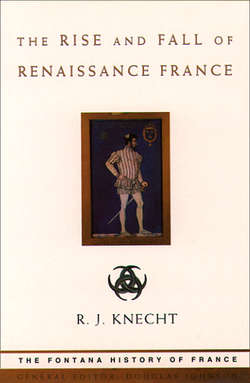Читать книгу The Rise and Fall of Renaissance France - R. Knecht J. - Страница 61
The League of Cognac (22 May 1526)
ОглавлениеFrancis’s repudiation of the Treaty of Madrid did not imply a readiness to resume hostilities with Charles V, at least for the time being. His chief aim was to recover his sons. To do this, he needed to put pressure on Charles by drawing closer to other European powers. On 15 May he ratified the Treaty of the More and on 22 May formed the ‘Holy’ League of Cognac with Venice, the papacy, Florence and Milan. Though ostensibly directed against the Turks, its real purpose was to expel imperial forces from Italy. Charles V had intended to go there to be crowned emperor by the pope. Now, because of the league, he felt obliged to stay in Spain and prepare for a new conflict. The allies were confident of success: the imperial army in Italy was penniless and disorganized, so Francis still hoped to recover his sons for a cash ransom. Charles, however, would not hear of this. ‘I will not deliver them for money,’ he declared. ‘I refused money for the father: I will much less take money for the sons. I am content to return them upon reasonable treaty, but not for money; nor will I trust any more the king’s promise, for he has deceived me, and that like no noble prince.’
By the autumn of 1526, Francis had come to realize that he needed to step up pressure on Charles. He made warlike noises, which encouraged the pope to act against the pro-imperial Colonna family in the States of the Church. French assistance, however, failed to materialize, and Clement VII’s situation soon grew desperate. In March 1527 he made a truce with the viceroy of Naples, who had landed in Tuscany with 9000 troops. Meanwhile, Francis looked to friendship with England rather than military involvement in Italy as the most economical way of bringing the emperor to heel. On 30 April, in the Treaty of Westminster, he and Henry VIII agreed to send a joint embassy to Charles to negotiate the release of Francis’s sons. If Charles refused their terms, war was to be declared on him.
From the pope’s point of view, the Anglo-French entente came too late. Despite his truce with Lannoy, the main imperial army under Bourbon invaded the States of the Church. On 6 May the Sack of Rome began. Bourbon was fatally wounded as he scaled the walls of the city, but his troops poured into it like a torrent, destroying everything in their path. Clement and some cardinals took refuge in the castle of Sant’ Angelo. On 5 June the pope signed a humiliating treaty which left him virtually a prisoner in imperial hands.
